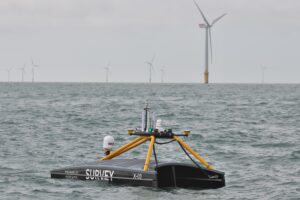Maritime minister announces plans to explore shore power

Vessels could one day plug into onshore power sources while berthed, lowering emissions, says the Department for Transport (DfT) as the maritime minister Robert Courts calls for evidence to gather information on shore power’s benefits for the shipping sector.
This follows the UK’s commitment to decarbonising the maritime sector through its Transport Decarbonisation Plan.
Courts is expected to call for acceleration of the UK’s ambitions to deliver a greener, more sustainable future for the shipping industry with plans to explore the roll out of emissions-cutting shore power at UK ports.
Shore power will be vital to decarbonising the maritime sector and improving air quality for local communities. Currently, berthed vessels must run their onboard diesel engines to power lighting, galleys, air-conditioning and other amenities, says DfT.
It’s the equivalent of a car or van idling while parked, emitting polluting fumes into the air around ports and contributing to greenhouse gas emissions. With shore power, vessels will be able to turn off their engines and plug into onshore power sources when berthed, reducing carbon emissions, noise and air pollution.
Launching the call for evidence at the annual UK Chamber of Shipping (UKCoS) Dinner this evening [7Feb22], Courts will also outline how, as well as vital environmental benefits, stimulating the innovation of new green technologies will continue the revival of the UK’s shipbuilding industry, bringing private investment, creating jobs, and revitalising coastal communities.
“Climate change is one of the biggest challenges this generation faces, and we will continue to lead international efforts to decarbonise the maritime sector,” says Courts.
“Shore power will end the outdated practice of ships keeping their engines running while anchored in port, reducing the poisonous fumes entering the air and ensuring we meet our net zero 2050 goals.”
“The ports industry has a key role to play in supporting the decarbonisation of shipping, and shore power will be an important part of that. This call for evidence is a step forward and will help us all better understand the current barriers to delivering more shore power to ships,” says Mark Simmonds, director of policy & external affairs for the British Ports Association. “We look forward to sharing the sector’s experiences so far and exploring how industry and government can work together to lower emissions in ports.”










